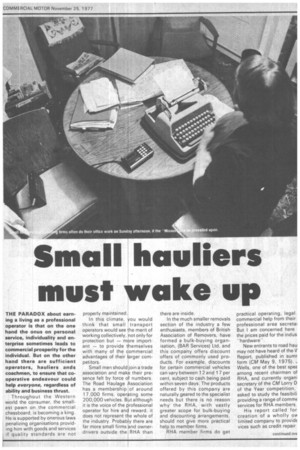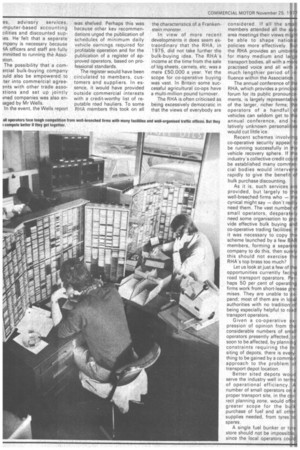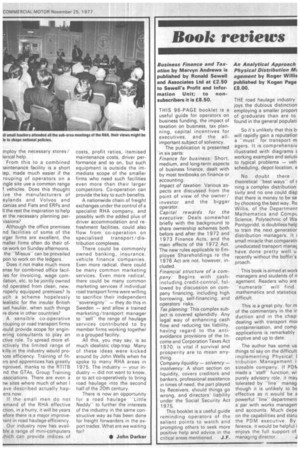Small hauliers must wake up
Page 61

Page 62

Page 63

If you've noticed an error in this article please click here to report it so we can fix it.
THE PARADOX about earning a living as a professional operator is that on the one hand the onus on personal service, individuality and enterprise sometimes leads to commercial prosperity for the individual. But on the other hand there are sufficient operators, hauliers ands coachmen, to ensure that cooperative endeavour could help everyone, regardless of ability and business thrust.
Throughout the Western world the consumer, the smallest pawn on the commercial chessboard. is becoming a king. He is supported by onerous laws penalizing organisations providing him with goods and services if quality standards are not properly maintained.
In this climate, you would think that small transport operators would see the merit of working collectively, not only for protection but — more important — to provide themselves with many of the commercial advantages of their iarger competitors.
Small men shouldjoin a trade association and make their presence felt by force of numbers. The Road Haulage Association has a membership of around 17,000 firms, operating some 200,000 vehicles. But although it is the voice of the professional operator for hire and reward, it does not represent the whole of the industry. Probably there are far more small firms and ownerdrivers outside the RHA than
there are inside.
In the much smaller removals section of the industry a few enthusiasts, members of British Association of Removers, have formed a bulk-buying organisation, (BAR Services) Ltd, and this company offers discount offers of commonly used products. For example, discounts for certain commercial vehicles can vary between 12 and 17 per cent, subject to cash being paid within seven days. The products offered by this company are naturally geared to the specialist needs but there is no reason why the RHA, with vastly greater scope for bulk-buying and discounting arrangements, should not give more practical help to member firms.
RHA member firms do get
practical operating, legal commercial help from their professional area secrete' But I am concerned here the prices paid for the indus -hardware-.
New entrants to road hau may not have heard of the V Report, published in sumr form (CM May 9, 1975). Wells, one of the best spee among recent chairmen of RHA, and currently organi secretary of the CM Lorry D of the Year competition, asked to study the feasibili providing a range of COMME services for RHA members.
His report called for creation of a wholly ovi 'limited company to providE vices such as credit repair es, advisory services,
,mputer-based accounting cilities and discounted supies. He felt that a separate mpany is necessary because -1A officers and staff are fully mmitted to running the Asso)tion.
The possibility that a cornercial bulk-buying company )uld also be empowered to ter into commercial agreeants with other trade assoItions and set up jointly vned companies was also en;aged by Mr Wells.
In the event, the Wells report was shelved. Perhaps this was because other key recommendations urged the publication of schedules of minimum daily vehicle earnings required for profitable operation and for the publication of a register of approved operators, based on professional standards.
The register would have been circulated to members, customers and suppliers. In essence, it would have provided outside commercial interests with a credit-worthy list of reputable road hauliers. To some RHA members this took on all the characteristics of a Frankenstein monster.
In view of more recent developments it does seem extraordinary that the RHA, in 1975, did not take further the bulk-buying idea. The RHA's income at the time from the sale of log sheets, carnets, etc, was a mere £50,000 a year. Yet the scope for co-operative buying was vast. In Britain some successful agricultural co-ops have a multi-million pound turnover, The RHA is often criticised as being excessively democratic in that the views of everybody are considered. If all the s members attended all the area meetings their views m be able to shape nati policies more effectively. the RHA provides an umb for many medium and la transport bodies, all with a practised voice and all wi much lengthier period of fluence within the Associati The annual conference of RHA, which provides a princ forum for its public pronoun ments, is largely representa of the larger, richer firms; operators of a handful vehicles can seldom get to annual conference, and latively unknown personal' would cut little ice.
Recent schemes invol co-operative security appea be running successfully in vehicle recovery sphere. If industry's collective credit cd be established many comm cial bodies would interve, ,e rapidly to give the benefit of bulk purchase discounting. .
As it is, such services are provided, but largely to the well-breeched-firms who — ihe cynical might say — don't real y need them. The vast numbet46f small operators, desperate y need some organisation to vide effective bulk buying and co-operative trading facilities If scheme launched by a few BAR it was necessary to copy fie members, forming a separate company to do this, then sure y this should not exercise 41e RHA"s top brass too much?
Let us look at just a few of the opportunities currently facig road transport operators. P rhaps 50 per cent of operating firms work from short-lease p mises. They are unable to pand; most of them are in I authorities with no traditio being especially helpful to r transport operators.
Given a co-operative pression of opinion from considerable numbers of s operators presently affected .4,1 soon to be affected, by plann t constraints requiring the Ili siting of depots, there is ev thing to be gained by a corn approach to the problem •1
transport depot location. transport depot location.
Better sited depots wo serve the industry well in ter of operational efficiency number of small operators o proper transport site, in the • rect planning zone, would o greater scope for the b supplies needed, from tyres spares. 1 A single fuel bunker or t purchase of fuel and all ot store should not be impossi • : since the local operators co : mploy the necessary stores/ lerical help.
From this to a combined laintenance facility is a short Eep, made much easier if the rouping of operators on a Ingle site use a common range f vehicles. Does this thought ive the manufacturers of eylands and Volvos and canias and Fiats and ERFs and lithe rest the inspiration to help et the necessary planning perlissions?
Although the office premises rod facilities of some of the orger firms are excellent, the mailer firms often do their ofce work on Sunday afternoons, the "Missus" can be prevailed pon to work on the ledgers.
Does it not make much more ense for combined office facilies for invoicing, wage cornilation, etc, to be jointly owned nd operated from clean, new, roperly equipped premises? Is uch a scheme hopelessly iealistic for the insular British )ad haulier, when such things re done in other countries?
A sensible co-operative rouping or road transport firms rould provide scope for enginering consultants to play an ctive role. To spread more ef3ctively the limited range of kills in the industry would prolate efficiency. Training of fit.).rs and apprentices has greatly nproved, thanks to the RTITB nd the GTAs, Group Training ,ssociations. There are even a ?AN sites where much of what I ave described actually hapens now.
If the small men do not emand of the RHA effective ction, in a hurry, it will be years efore there is a major improve-tent in road haulage efficiency.
Our industry now has availble a range of mini-computers ihich can provide indices of costs, profit ratios, itemised maintenance costs, driver performance and so on, but such equipment is outside the immediate scope of the smaller firms who need such facilities even more than their larger competitors. Co-operation can provide the key to such benefits.
A nationwide chain of freight exchanges under the control of a specialist RHA company, and possibly with the added plus of driver accommodation and refreshment facilities, could also flow from co-operation on
specialised transport/distribution complexes.
There could be commonly owned banking, insurance, vehicle finance companies. Even more radical, there could be many common marketing services. Even more radical, there could be many common marketing services if individual road transport firms were willing to sacrifice their independent "sovereignty" — they do this in Sweden — and allow a trained marketing /transport manager to "sell-the range of haulage services contributed to by member firms working together in a grouped facility.
All this, you may say, is so much idealistic clap-trap. Many of these ideas were kicked around by John Wells when he spoke to many RHA areas in 1975. The industry — your industry — did not want to know, or to act co-operatively to bring road haulage into the second half of the 20th century.
There is now an opportunity for a road haulage "Little Neddyto further the interests of the industry in the same constructive way as has been done for freight forwarders on the export trades. What are we waiting for?
• John Darker










































































































